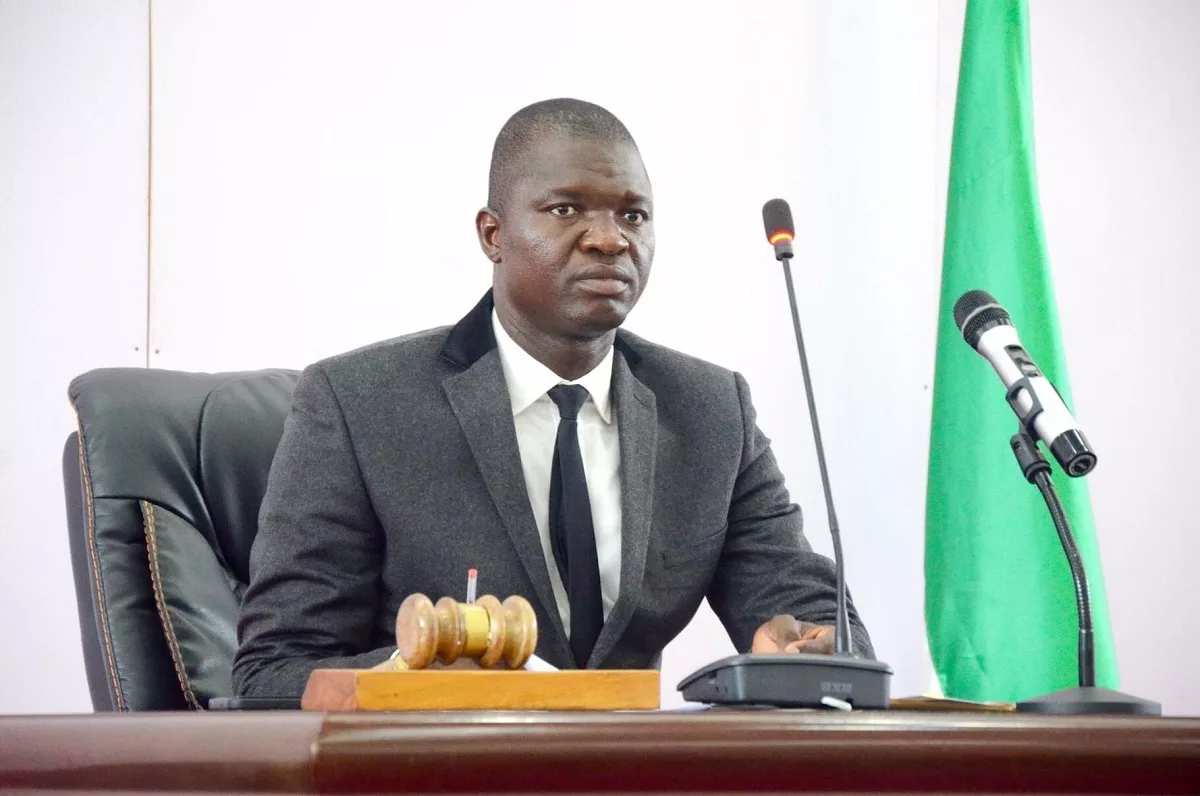 Chief Justice of Nigeria, Kudirat Kekere-Ekun
Chief Justice of Nigeria, Kudirat Kekere-EkunWhen he died at 80 in June 2008, Lamidi Aribiyi Adedibu was one of the best known political godfathers of his generation and certainly one of the most disruptive in Nigeria. In Ibadan, Oyo State in south-west Nigeria, where he held sway, Adedibu was reputed to have “made a governor of a mere chairmanship aspirant; a deputy governor of an alleged vulcaniser; a senator of a carpenter; a Reps member of a motor boy – all through the instrumentality of force and subterfuge.” About his politics which was described as ‘violently democratic’, Adedibu argued that it was all designed to render the line of succession to high executive office both predictable and devoid of needless drama, just as you have with succession to the monarchy in England.
Succession in an elective system is, of course, not supposed to replicate the predictability of monarchical entitlement. In Nigeria today, however, the one recognised exception to this is succession to the high office of Chief Justice. In the week in which the Senate concluded the confirmation of a new Chief Justice of Nigeria (CJN) in supersonic fashion, it may be useful to recall that succession to that office was not always devoid of drama.
Until this week, there had been 22 occupants of the position of Chief Justice since the Amalgamation in 1914. Edwin Speed occupied the office for four years from 1914 to 1918. Ralph Combe succeeded him until 1929. Donald Kingdon, who functioned as Chief Justice of colonial Nigeria until 1946, remains the longest-serving occupant of the office, having held it for nearly seventeen years from 1929. John Verity succeeded him for eight years until 1954 and he was followed by Stafford Foster-Sutton, the last of the colonial Chief Justices who served until 1958.
By 1957 it was clear that Sir Stafford would vacate the position the following year. The jockeying to succeed him began in earnest for the historic role of Nigeria’s first indigenous Chief Justice. At the time, Olumuyiwa Jibowu a lawyer since 1923 and High Court Judge since 1942 was presumed to be in pole position for the role. He was also the first Nigerian Justice of the Federal Supreme Court. Sir Olumuyiwa preceded his closest competitor, Adetokunbo Ademola, to the Bar by 11 years and to the Bench by seven. His credentials seemed impeccable. At the time, Sir Adetokunbo was Chief Justice of the Western Region.
At the parliamentary session in 1957, the member of the House of Representatives representing Owerri, Dennis Abii of the National Council of Nigeria and Cameroons (NCNC), tabled a motion calling on the Governor-General to “pray Her Majesty the Queen to remove Mr. Justice Jibowu from his office as a judge, on the ground that he has taken sides in party politics as disclosed in the letter written by him to one Mr. Savage.” Written three years earlier in 1954, Sir Olumuyiwa’s letter allegedly said some uncomplimentary things about Dr. Azikiwe and his NCNC.
Dr Nnamdi Azikiwe was a leading figure in Nigeria’s anti-colonial politics who would later emerge as Nigeria’s first post-colonial leader. Following Dennis Abii’s motion, the NCNC printed and disseminated the alleged letter by Sir Olumuyiwa to make their point that he was too partisan to be Chief Justice. This controversy gave legs to the then distant ambitions of Sir Adetokunbo, who eventually emerged on 1 April 1958 to become the first indigenous Chief Justice of Nigeria.
Over the next two decades, the office of the CJN evolved only incrementally, never losing its essential character as a first among equals. In that period too, appointment to the position always offered some drama and unpredictability. When Sir Adetokunbo retired in 1972, the Federal Military Government appointed as his successor Taslim Elias, an academic whose tenure as Attorney General of the Federation paralleled Sir Adetokunbo’s as Chief Justice for all but seven months over the period since Independence in October 1960.
Nigerians need credible journalism. Help us report it.
Support journalism driven by facts, created by Nigerians for Nigerians. Our thorough, researched reporting relies on the support of readers like you.
Help us maintain free and accessible news for all with a small donation.
Every contribution guarantees that we can keep delivering important stories —no paywalls, just quality journalism.
When Professor Elias abdicated the office of CJN in 1975, the military appointed in his place Sir Darnley Alexander, a legal draftsman of Caribbean origin and, at the time, Chief Justice of the South-Eastern State. Sir Darnley naturalised to become Nigerian, while occupying the office of CJN.
In somewhat controversial circumstances in August 1979, the departing military government appointed Atanda Fatayi Williams to the office of CJN in succession to the retiring Sir Darnley. Thus began a convention which subsists to date of designating for the office the senior-most serving Justice of the Supreme Court.
Given this convention, it was entirely predictable that Kudirat Kekere-Ekun would succeed Olukayode Ariwoola to become the 18th indigenous CJN. As the senior-most serving Justice of the Supreme Court, her march to the office seemed inexorable. Under the constitution, the president makes the appointment following confirmation of the nominee by the Senate.
In this case, the Senate concluded the confirmation hearing in a perfunctory process scheduled without public notice or participation. Quite apart from affording confirmation to the nominee for the exalted office of CJN, this process also sadly confirmed the capture of the office by a narrow tribe of self-indulgent politicians.
In this most recent confirmation, the politicians appeared only intent on securing from the nominee guarantees to assure the political appropriation of the office of CJN and the preclusion of public accountability by the judicial branch. Senate President, Godswill Akpabio, threw her the softball of a question about how to shut down public discussion about incredible judicial decisions like the one that made Akpabio and his predecessor, Ahmad Lawan, candidate(s) for the Senate from primaries that they did not participate in.
The response was fulsome: “I want to assure you that as chairman of the Legal Practitioners’ Privileges Committee, we will ensure that those who should be disciplined, those who are in the habit of speaking on social media, condemning the judiciary, commenting on cases that are sub judice, will not have anywhere to hide. They will be dealt with decisively.”
The Senate President beamed with characteristically contumelious corpulence.
The outcome was never in doubt. The politicians got the assurances they wanted that they would continue to own the judiciary. In return, the nominee sailed through to confirmation without incident.
Access to the office may now follow a pattern that Lamidi Adedibu would have enthusiastically prescribed but the fate of her three immediate predecessors must hold immense lessons for new CJN.
First, the Chief Justice may have become somewhat of a constitutional potentate but the lesson from the fate of Walter Onnoghen as CJN is that this potentate has feet of clay. The same politicians who have contrived to put the CJN above the constitution can decapitate the occupant when it suits them.
Second, the Chief Justice may well be more than merely a first among equals these days but one lesson evident from the fate that befell Tanko Muhammad as CJN is that a Chief who neglects the wellbeing of his or her peers may not last in the role.
Third, a Chief Justice must think of their legacy and one who behaves with the abandon of a drunken political sailor, like Olukayode Ariwoola – the immediate past occupant of the office – may inherit the material world but lose the soul of the judiciary.
For the moment, we must welcome to this high office only the second woman ever to occupy the office of CJN. There will be time for her to decide whether (like the first woman to occupy the office) she chooses to see this as a high responsibility or, as her immediate predecessor, she prefers to see it as an office.
Chidi Anselm Odinkalu, a lawyer, teaches at the Fletcher School of Law and Diplomacy and can be reached through chidi.odinkalu@tufts.edu.
Support PREMIUM TIMES' journalism of integrity and credibility
At Premium Times, we firmly believe in the importance of high-quality journalism. Recognizing that not everyone can afford costly news subscriptions, we are dedicated to delivering meticulously researched, fact-checked news that remains freely accessible to all.
Whether you turn to Premium Times for daily updates, in-depth investigations into pressing national issues, or entertaining trending stories, we value your readership.
It’s essential to acknowledge that news production incurs expenses, and we take pride in never placing our stories behind a prohibitive paywall.
Would you consider supporting us with a modest contribution on a monthly basis to help maintain our commitment to free, accessible news?
TEXT AD: Call Willie - +2348098788999


















 English (US) ·
English (US) ·